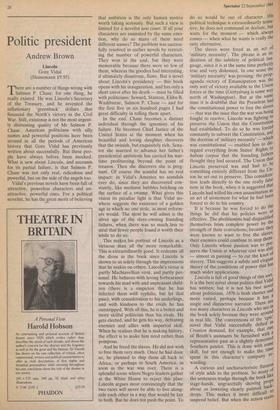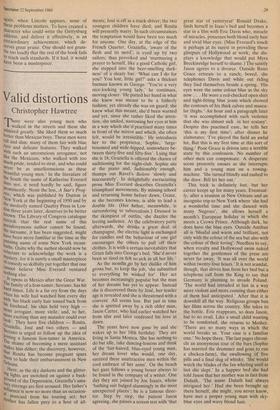Politic president
Andrew Brown
Lincoln Gore Vidal
(Heinemann £9.95) ere are a number of things wrong with
ere P. Chase: for one thing, he really existed. He was Lincoln's Secretary of the Treasury, and he invented the inflationary 'greenback' dollars that financed the North's victory in the Civil War. Still, existence is not the most urgent- ly distressing quality of Mr Salmon P. Chase. American politicians with silly names and powerful positions have been around in all the periods of American history that Gore Vidal has previously written about successfully. But these peo- ple have always before been mocked. What is new about Lincoln, and accounts for its partial failure, is that Salmon P. Chase was not only real, ridiculous and powerful, but on the side of the angels too.
Vidal's previous novels have been full of attractive, powerless characters and un- attractive, powerful ones. For a political novelist, he has the great merit of believing
that ambition is the only human motive worth taking seriously. But such a view is limited for a novelist tout court. If all your characters are animated by the same emo- tion, why do so many of them need different names? The problem was success- fully resolved in earlier novels by restrict- ing the number of powerful characters. They won in the end, but they were memorable because there were so few of them, whereas the goodies had interesting, if ultimately disastrous, flaws. But a novel about Lincoln's presidency — this book opens with his inauguration, and has only a short envoi after his death — must be filled with politicians: Seward, Stanton, Elihu B. Washburne, Salmon P. Chase — and for the first five or six hundred pages I had great difficulty in telling them apart.
In the end, Chase becomes a distinct individual through the ignominy of his failure. He becomes Chief Justice of the United States at the moment when his beautiful and loving daughter discovers that the swinish, but exquisitely rich, Sena- tor she married to advance her father's presidential ambitions has carried his war- time profiteering beyond the point of treason. Then she discovers she is preg- nant. Of course the scandal has no real impact: in Vidal's America no scandals ever do, since they are discovered con- stantly, like methane bubbles belching on the surface of a swamp. What gives this vision its peculiar light is that Vidal no- where suggests the existence of a golden age in which no one stole, as most reform- ers would. The most he will admit is the silver age of the slave-owning founding fathers, when there was so much less to steal that fewer people found it worth their while to do so.
This makes his portrait of Lincoln as a virtuous man all the more remarkable. This is extraordinarily good. It redeems all the dross in the book since Lincoln is shown to us solely through the impressions that he makes on others. Lincoln's virtue is partly Machiavellian virtu, and partly per- sonal. He behaves with loving forbearance towards his mad wife and unpleasant child- ren (there is a suspicion that he has infected them with syphilis, but let that pass), with consideration to his underlings, and with kindness to the rivals he has outstripped. With all this, he is a better and more skilful politician than his rivals. He gets elected, and he gets his way, defeating enemies and allies with impartial skill. When he realises that he is making history, the effect is to make him tired rather than pompous.
And he freed the slaves. He did not wish to free them very much. Once he had done so, he planned to ship them all back to Africa, or perhaps to South America, as soon as the war was over. There is a splendid scene where Negro leaders gather at the White House to reject this plan: Lincoln argues most convincingly that the two races will never be able to live along- side each other in a way that would be fair to both. But he does not push the point. To
Spectator 22 September 1984 do so would be out of character. His political technique is extraordinarily tenta- tive; he does not command or declare, but waits for the moment — which always comes — when what he wants is really the only alternative.
The slaves were freed as an act of
In- dication necessity'. The phrase is an n- dication of the subtlety of political lan- guage, since it is at the same time perfectly true and very dishonest. In one sense the 'military necessity' was pressing: the prop- aganda victory of Emancipation was the only sort of victory available to the Union forces at the time (Gettysburg is some way north of Washington). But at the same time it is doubtful that the President had the constitutional power to free the slaves
that was the issue that the war was being
fought to resolve. Lincoln was fighting to preserve the Union that the Constitution had established. To do so he was forced constantly to subvert the Constitution, and the doctrine of 'military necessity' — winch was constitutional — enabled him to dis- regard everything from States' Rights to habeas corpus that the founding fathers thought they had secured. The Union that Lincoln preserved was and had to he something entirely different from the Un- ion he set out to preserve. This considera- tion leads directly to the one really false note in the book, when it is suggested that Lincoln had willed his own assassination as an act of atonement for what he had been forced to do to his country.
It is because he was forced to do the
things he did that his policies were s° effective. The abolitionists had disqualified themselves from complete power by the strength of their convictions; because they were known to want to free the slaves, their enemies could combine to stop thein. Only Lincoln whose passion was to Pre- serve the Union at whatever cost was able,. almost in passing — to cut the knot of slavery. This suggests a subtle and elegant theory of the conditions of power that has much wider applications. Lincoln is full of good things of this so rti It is the best novel about politics that Vida
has written; but it is not his best novel ,
about politicians. 1876 is both shorter and more varied, perhaps because it has a single and distinctive narrator. There are too many characters in Lincoln who are in, the book solely because they were arouna, in real life. The conventions of the 'Ole novel that Vidal successfully defied in Creation demand, for example, that one of Booth's assistants be furnished with A3 representative past as a slightly dement' Southern patriot. This is done with sore skill, but not enough to make the time spent in this character's company re warding. A curious and uncharacteristic flatness, of style adds to the problem. So manY.cn the sentences trudge through the book like stage-hands, ungracefully shoving Profs about or lowering clearly painted back drops. This makes it more difficult W suspend belief. But when the action starts again, when Lincoln appears, none of these problems matters. To have created a character who could write the Gettysburg address, and deliver it effectively, is an extraordinary achievement, which de- serves great praise. One should not grum- ble too loudly that the rest of the book fails to reach such standards. If it had, it would have been a masterpiece.











































 Previous page
Previous page